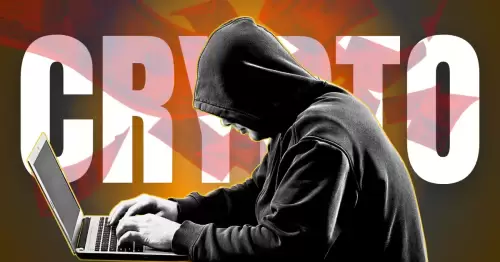 |
|
 |
|
 |
|
 |
|
 |
|
 |
|
 |
|
 |
|
 |
|
 |
|
 |
|
 |
|
 |
|
 |
|
 |
|
Cryptocurrency News Articles
Arizona Launches Its First Bitcoin (BTC) and Digital Asset Reserve Fund by Signing HB 2749 into Law
May 08, 2025 at 01:31 pm
Arizona has officially launched its first Bitcoin and Digital Asset Reserve Fund by signing House Bill 2749 into law. The bill does not authorize new investments.

Arizona has launched its first Bitcoin and Digital Asset Reserve Fund after Governor Katie V. Hobbs signed House Bill 2749 into law. The bill, which does not authorize new investments but focuses on handling unclaimed digital assets, comes shortly after New Hampshire passed HB 302, making it the first state to create a Bitcoin (BTC) reserve.
Hobbs previously vetoed Senate Bill 1025, known as the Arizona Strategic Bitcoin Reserve Act, earlier this month. The bill would have permitted the state to invest public funds and seized crypto in Bitcoin.
However, the governor expressed concerns over the volatility of digital assets and their unsuitability for state-backed retirement system investments. These concerns arose from a provision in SB 1025 that would have allowed the state treasurer to decide on additional investments in Bitcoin.
“Days after vetoing SB 1025, which would have let Arizona invest public funds and seized crypto into Bitcoin, Gov. Katie Hobbs (D) signs HB 2749, a scaled-down version that funds a BTC reserve using unclaimed crypto, airdrops, and staking rewards,” VanEck’s Head of digital assets research, Matthew Sigel, said.
HB 2749 permits the state to claim ownership of abandoned digital assets if the owner does not respond to communications within three years. Once the state assumes control of these assets, its custodians may stake the crypto to earn rewards or receive airdrops from the digital asset creators.
Any rewards earned through staking or airdrops will be transferred to a newly created Bitcoin and Digital Asset Reserve Fund, allowing the state to manage these unclaimed assets and their earnings.
“This law ensures Arizona doesn’t leave value sitting on the table and puts us in a position to benefit from abandoned digital currency. It’s exactly the kind of policy we should be leading on—modern, precise, and built with an understanding of where technology and finance are heading,” Bill’s sponsor, Representative Jeff Weninger, said.
Arizona’s legislative efforts extend beyond HB 2749. Two additional bills, SB 1373 and HB 2324, are still being considered by the state legislature.
SB 1373 proposes the establishment of a Digital Assets Strategic Reserve Fund in Arizona, managed by the state treasurer. The fund will consist of appropriated funds and seized digital assets, which a qualified custodian will securely store.
The bill further permits the state to invest up to 10% annually and engage in lending activities using digital assets to generate returns, without incurring any additional financial risks.
Meanwhile, HB 2324, which aimed to create a reserve for forfeited digital assets, failed its final reading on Sunday despite earlier approval by the state House of Representatives. However, the bill is subject to a motion for reconsideration.
In other developments, Texas’s Strategic Bitcoin Reserve Bill (SB 21) has passed the Senate and is now headed for a floor vote in the lower chamber of Congress.
The bill, which would create a Bitcoin reserve fund using state treasury funds, has seen swift progress in the Senate.
Julian Fahrer, founder of Bitcoin Laws, noted that the bill should be one vote away from approval in the House.
“Texas Bitcoin Reserve should be 1 vote away. TX legislature adjourns on 6/2, so we should know within ~3 weeks at the latest,” he said.
In Oregon, Governor Tina Kotek has signed SB167, a cryptocurrency bill that updates the state’s Uniform Commercial Code to provide clarity on how digital assets are recognized.
The bill, which passed the state legislature earlier this month, also includes provisions for integrating digital assets into the state’s financial system.
“Gov. Kotek signs cryptocurrency bill, HB 2749, adjusting state law to best recognize digital assets and providing a framework for their recovery by the state,” Bitcoin Laws posted.
The bill updates the state’s Uniform Commercial Code to provide much needed clarity on how digital assets are treated e.g. legally recognized as collateral.
“Big milestone for adoption.”
Despite these state-level advancements, Florida’s Bitcoin Reserve proposals, HB 487 and SB 550, have stalled in the legislature.
Both bills, which aimed to create a Bitcoin reserve fund and introduce regulations for cryptocurrency exchanges, faced opposition from state lawmakers, ultimately stalling their progress.
Disclaimer:info@kdj.com
The information provided is not trading advice. kdj.com does not assume any responsibility for any investments made based on the information provided in this article. Cryptocurrencies are highly volatile and it is highly recommended that you invest with caution after thorough research!
If you believe that the content used on this website infringes your copyright, please contact us immediately (info@kdj.com) and we will delete it promptly.
-

- Kaspa (KAS) at a Major Crossroad Again: Volatility Expected — Where is Price Headed Next?
- May 08, 2025 at 08:30 pm
- The Kaspa (KAS) chart is flashing a serious warning sign for both bulls and bears. After a lengthy period of sideways movement and failed breakouts, KAS has returned to test a familiar level.
-

-

-

-

-

-

-

-






















![[2025.05.08] The two routes of Bitcoin continue to be observed, and gold is still bullish. [2025.05.08] The two routes of Bitcoin continue to be observed, and gold is still bullish.](/uploads/2025/05/08/cryptocurrencies-news/videos/routes-bitcoin-continue-observed-gold-bullish/image_500_375.webp)





































